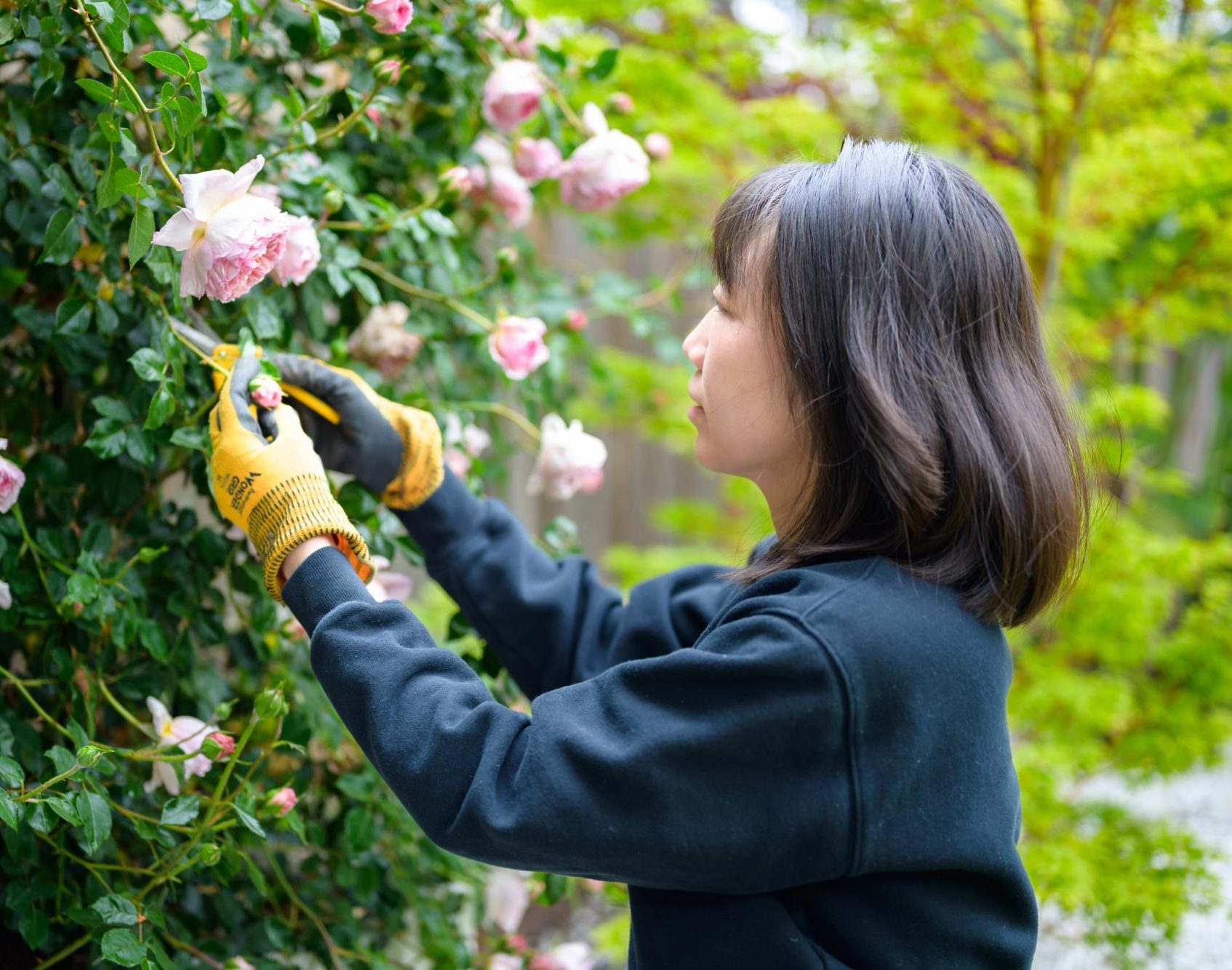Roses are red and hydrangeas are blue — but only at low soil pH. Roses can also be orange, as chemistry teacher Ran Tao learned. Some can even be brown, like the Koko Loko rose, Dr. Tao’s favorite.
Gardening initially captured Dr. Tao’s interest because of its demand for continuous learning. She loves the mental challenge and growth from both teaching and gardening.
“I will always think of myself as a lifelong learner because I do really like to learn new things and also learn lots of fancy demos and labs from the other chemistry teachers here,” Dr. Tao said. “It’s the same with gardening: In the beginning, of course the flowers blooming and being pretty is rewarding, but during the process, I am also learning and extending my knowledge.”
Science department chair and biology teacher Anita Chetty recognized Dr. Tao’s scholarliness from the get-go. After the departure of Harker’s Analytical Chemistry teacher in June, Chetty remembered how Dr. Tao immediately volunteered to teach the class.
“The first thing [Dr. Tao] said after saying, ‘Oh, that’s too bad,’ was, ‘How can I help?’” Chetty said. “She was so excited to take it on, even though it was only her second year and that elective is so complex. If you ask her for help, she will go above and beyond. Consequently, we all benefit from that commitment.”
After moving to a Bay Area home with a backyard, Dr. Tao began cultivating different species of flowers. Determining how to grow healthy roses was a painstaking cycle of trial and error, especially because many of her roses were susceptible to a multitude of diseases, but she realized that a lot of the methods she was using to make sure her plants flourished were similar to the chemistry laboratory procedures she was already so familiar with.
“Gardening has taught me to figure out the problems in the things that I do,” Tao said. “I do some research, try some plans and see: does it work or not? And then I adjust the plan. It’s all applied to everything, whether it’s in research or when I’m teaching. If the curriculum doesn’t work, how can I adjust it? Then I do that and see if I improve or not, and that’s how gardening has benefited me.”
Between tending to her plants in her garden and helping her students grow at school, Dr. Tao has drawn more parallels between her two walks of life. Just like roses have varying periods of expansion, her students will have days of substantial growth but also experience stretches of relative stagnation.
“Helping my students grow is sort of like watching my plants grow,” Tao said. “In gardening, my plants will eventually blossom and sometimes grow fruit. Similarly, my students are always growing, and at the end, I can see how different they are. It’s just really one of the amazing factors of nature.”
Patience, Dr. Tao discovered through numerous chemistry experiments and seasons of planting, is the common ingredient for success in teaching, gardening and life in general.
“For subjects like computer science, you can just click some buttons and see results soon after.” Tao said. “But that never works for chemistry, has never ever worked for my gardening, and it’s never worked for teaching either. I just have to have patience.”
In addition to fostering persistence, patience goes hand in hand with effective time management too. Chemistry teacher Andrew Irvine praised Dr. Tao for planning ahead of time and having the capacity to be patient.
“We were preparing for a thermochemistry lab, and she’s already putting together the kits before anyone else knew that it’s time to get it going,” said Irvine. “She’s a step ahead in planning and also stepping up when people might have things going on.”
Despite dealing with teaching time commitments, Dr. Tao relishes the serenity of tending to her plants for a break from work.
“There are no kids and no school. I just concentrate on some work by myself. It’s relaxing, like meditation,” Dr. Tao said. “Under the sunshine and with the flowers and the plants, it is my calm time, and it’s very refreshing.”
Whether through teaching, gardening or any other activity, Dr. Tao does her best to stick with her mantra of continuous learning by looking to new horizons.
“When I am tired with gardening, I am going to switch to other areas I have no idea about and can keep learning,” Dr. Tao said. “That also keeps your brain strong during the learning process, just practicing with brain muscles, especially as I am getting old and sometimes start to forget. The things I do are all part of the process of learning stuff and expanding my knowledge.”




